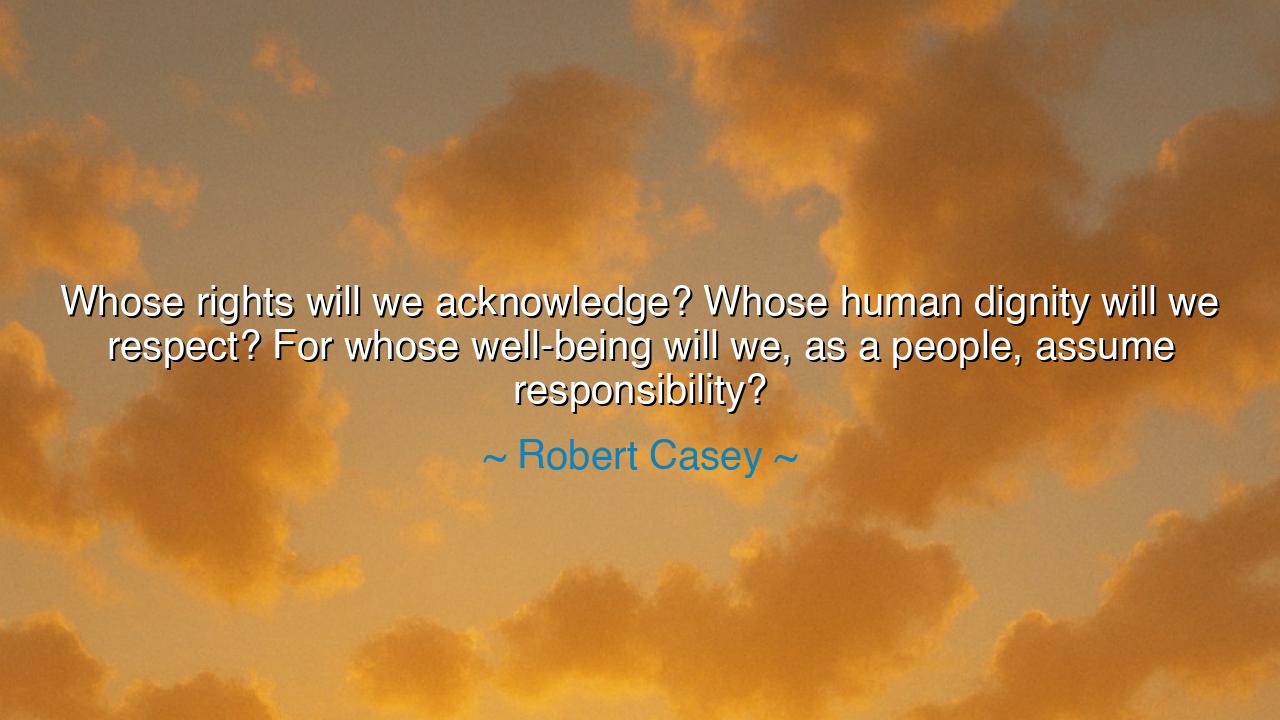
Whose rights will we acknowledge? Whose human dignity will we
Whose rights will we acknowledge? Whose human dignity will we respect? For whose well-being will we, as a people, assume responsibility?






In the voice of Robert Casey we hear questions that strike like a bell at the heart of conscience: “Whose rights will we acknowledge? Whose human dignity will we respect? For whose well-being will we, as a people, assume responsibility?” These are not idle musings, but challenges hurled across the ages, questions that each generation must answer anew. For they ask us not only what laws we will write, but what kind of people we will become.
To ask, “Whose rights will we acknowledge?” is to confront the truth that throughout history, rights have never been granted to all at once. There were times when slaves had no rights, when women had no rights, when children labored unseen in factories. In each age, some voices declared, “Not these people, not yet.” And in each age, brave souls rose to say, “Yes, even these.” Thus Casey reminds us that rights are not abstractions; they are acknowledgments of humanity itself. To deny them to one is to weaken the foundation for all.
When he speaks of “human dignity”, he points to that invisible crown which every soul wears. Dignity is not earned by wealth, nor by fame, nor by power. It is inherent in the very fact of being human. And yet, history shows how easily men trample this truth. Consider the death camps of the Holocaust, where millions were treated not as persons but as numbers. The world recoiled in horror because dignity, once denied, reveals how monstrous humanity can become. Casey’s call is to remember that the worth of a person is not conditional, but absolute.
His third question, “For whose well-being will we assume responsibility?” challenges us to move beyond mere acknowledgment into action. It is one thing to say, “Yes, they have rights, yes, they have dignity.” It is another to provide food for the hungry, care for the sick, shelter for the homeless. Responsibility is the proof of compassion. Without it, our respect is hollow. History shows this in the story of the Good Samaritan, who did not merely respect the wounded man in theory but stooped, bound his wounds, and bore his weight. Responsibility is where respect becomes real.
The origin of Casey’s words lies in the eternal debates of democracy and justice. As governor of Pennsylvania, he often spoke of protecting the vulnerable, whether the poor, the unborn, or the forgotten. His questions echo the prophets of old, who cried out to nations that justice must roll down like waters and righteousness like an ever-flowing stream. They are timeless because they pierce the heart: for in every age there are those whose rights are dismissed, whose dignity is overlooked, and whose well-being is left to chance.
The deeper meaning of these words is that a people are judged not by how they treat the strong, but by how they honor the weak. Rome boasted of its legions, yet it was the cries of slaves and conquered peoples that revealed its cracks. America speaks of liberty, but it is in the treatment of its poorest, its immigrants, its marginalized, that its true character is revealed. Casey’s questions burn like a mirror, forcing us to see not what we say of ourselves, but what we actually do.
The lesson for us is urgent. Each person must answer these questions not only as a nation, but as an individual. Whose rights will you acknowledge? Whose dignity will you respect? For whose well-being will you assume responsibility? Begin with the people near you—the neighbor overlooked, the worker dismissed, the stranger unheard. And carry it outward to the greater world, advocating for justice, mercy, and equality. For if we all answer with courage, then a people will rise whose greatness is not in armies or wealth, but in the steadfastness of their compassion.
Thus Robert Casey’s words are not questions alone—they are a summons. They demand that we choose: will we build a society of indifference, or a society of respect and care? May we choose the latter, for in that choice lies the hope of generations yet unborn, and the enduring light of humanity’s highest calling.






AAdministratorAdministrator
Welcome, honored guests. Please leave a comment, we will respond soon